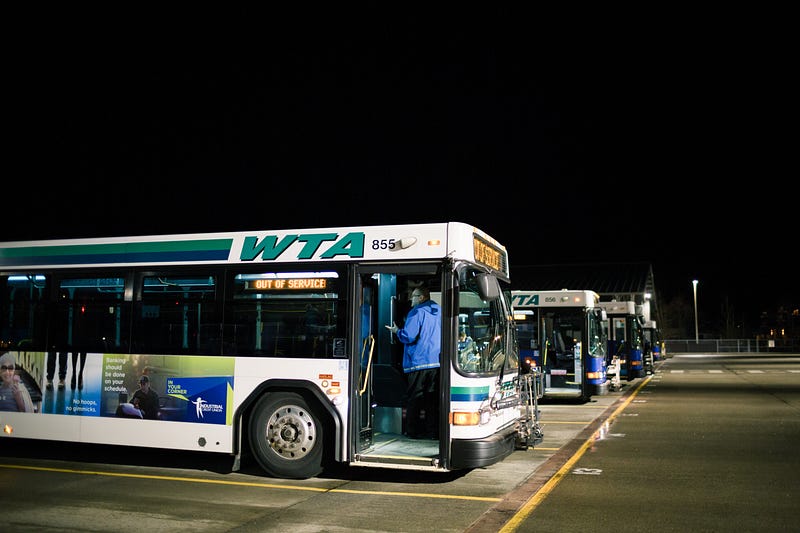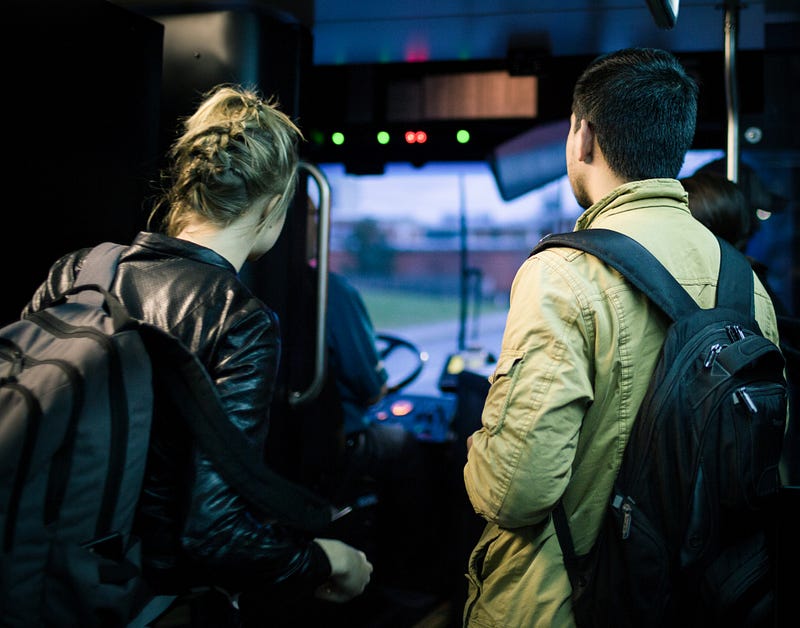Behind the Wheel
A day in the life of a bus driver who keeps Western students moving
Story: Brenna Visser
Photos: Zoe Deal

Jim Coleman’s day starts precisely at 6:41 a.m.
“Not 6:40, not 6:45,” he laughed. “I clock in at 6:41. Every minute counts here.”
Lines of hollow parked buses sit dormant as the rain drizzles on a January morning. At 6:45 a.m., one of them softly glows to break the darkness. At 6:46 a.m., the horn blares.
Beeeeep.
“Horn still works,” Jim Coleman muttered. He checks another box on the form he checks every morning to make sure the bus is in working order before another turn at shuttling Western students to and from classes.
Coleman is one of 150 Whatcom Transit Authority bus drivers who facilitate the 2 million rides Western students take each year. At 60 years old, the Bellingham native has been doing so for the past 16 years.

“College students? They’re an easy crowd. They’re very efficient — they have their cards out before the get onto the bus and they find their seats quickly,” he says. “In general, they are very respectful.”
By 7 a.m., the bus is rolling down the still silent streets of Bellingham, headed for the downtown station. He sets his green water bottle in his cup holder, but noticeable at this hour of morning, no cup of coffee.
“Drinking coffee during your shift just makes you go to bathroom more, and sometimes you don’t get to go to the bathroom exactly when you want,” Coleman says.
The bus driving opportunity literally fell into his lap when his wife saw an ad in the The Bellingham Herald for the job. She filled it out and told him she thought he would be a good fit.
“I like driving, and I always got along with people, so it seemed like it would be a good fit,” he says.
At 7:27 a.m., he pulls into the Lincoln Park and Ride. Students quietly shuffle onto the bus, thermoses in hand and earbuds in ears. Each swipes their card through the machine in a predictable cadence.
“Good morning.” Beep. “Good morning.” Beep. “Good morning-”
“Does this bus go to campus?” one student asks before Coleman can finish his greeting.
“Yes,” he says. Beep.
The bus falls silent and bright iPhones illuminate the faces tilted forward. As Coleman climbs the hill on Bill McDonald Parkway, he remembers the year he attended Western himself. He studied chemistry and physics at the university and most of the buildings he stops at today didn’t exist then.
“Buchanan Towers,” he says, over the intercom. 7:36 a.m.
But he left Western to pursue a job where he could get his “hands more dirty” through a machinist program offered at Bellingham Technical College.
Coleman has always loved operating machinery. If he were to be anything but a bus driver, it would be an engineer or airline pilot. He took a flight lesson and joked that flying an airplane and driving a bus were “oddly similar,” but his first love before buses was motorcycles.
Motorcycle racing, to be exact.
“My first motorcycle was a red, 1967 Suzuki 120. I would race with later bikes around the Hannegan Speedway, but I’m not really that competitive,” he says. “Racing was an outlet to see if my mechanical experiments with my motorcycle would work.”
He pauses. The bus lurches. “Campus Services,” he says into the intercom before settling back into silence. 7:38 a.m.
Out in rural Whatcom County, he still races the motorcycle on trails weaving through his wooded, 5-acre property. A lot of those Douglas Firs — 500 over 10 years — were personally planted by him.. Tending to his trees reminds him of his childhood out at Gooseberry Point on the Lummi Reservation.
Once his shift ends at 3:33 p.m., he likes to go out and tend to the trees to make sure they are healthy.
“I’m the type of person who likes to put out seeds for birds when it snows, or serving soup at the soup kitchen, so I guess that carries over to helping the guy with crutches who needs a seat or understanding when someone doesn’t have a dollar for bus fare,” Coleman says.
Prior to taking a job as a bus driver, Coleman spent slightly over three years volunteering at soup kitchens and halfway homes in Texas and Bellingham. He has found the skills he learned relating to people in a soup kitchen are not unlike the one he uses every day on the bus route.
“Driving the bus is the easy part. The passengers are the job,” he says. “One time, I had someone ask me to go through the bank drive-thru. I mean, I’m not a Toyota.”
He laughed, followed with a sigh. “The most important quality to have as a bus driver? Patience. Definitely patience.”
The bus lurches. “Ridgeway.” Swipe. 7:40 a.m.
At this point in the morning, the bus is stuffed wall to wall with students shuffling in a pack toward the back to make more room.
As the bus rolls down College Way, Coleman recalls how his time volunteering at the halfway houses lead him into Christianity. He and his wife now open up their Bellingham home as a place to practice a type of prayer that focuses on supernatural healing — a practice that isn’t always easy to find in a standard church.
“I wasn’t raised in a church growing up, but I was inspired after dealing with people with real life struggles at the halfway house,” he says. “My wife and I have an individual experience with God. I guess my spiritually also kind of goes with the birdfeeder thing.”
A student near the front of the bus looked up from his phone.
“Isn’t it weird that we are so scared to show our faith?” the student asked.
Coleman glances to his right, “Yeah. It’s good to just feel like you are helping someone.”

“Yeah. Sometimes I am scared of what people may think if I show my faith too much,” the student responds.
The bus lurches at 7:43 a.m. “Haggard Hall,” Coleman says.
The students file off the bus with the occasional, “Thank you!”
A day doesn’t go by where Coleman doesn’t have his routine tested. Sometimes that means having a student ride a bus to Ferndale who meant to go to downtown Bellingham. Other times, it’s just fighting traffic so slow that he doesn’t get the chance to take five minutes to himself to eat his banana in the break room.
But today, he pulled into the downtown station right in time for his 9 a.m. lunch.
“You do get behind sometimes, but what you learn is that there is nothing you can do about it. Eventually, you catch up,” he says. “You just have to wait until the light turns green.”
